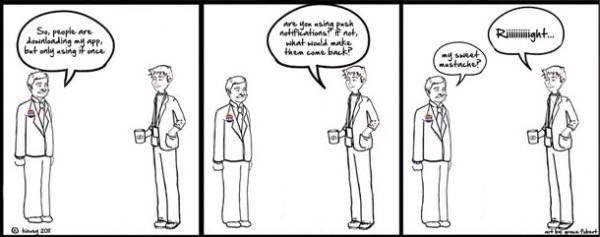Urban Airship made big news in the startup community yesterday with its acquisition of backend location services provider SimpleGeo. Last December we called SimpleGeo the most promising company of 2011 because of the way it provides location data for applications and the approach the company uses to tackle the problem. Urban Airship agrees that SimpleGeo has great potential, hence the acquisition.What does this mean for the backend-as-a-service mobile cloud realm?

A Natural Partner
Urban Airship does not see itself competing against the likes of StackMob, Kinvey or Parse, but it definitely works within that space. One exec called it a “really clever move.” Another thought that this is a sign of consolidation within the backend mobile services realm. Either way, it is a big move for both Urban Airship and SimpleGeo.

SimpleGeo + Urban Airship t-shirts have already been made
Urban Airship was one of the first companies to tie push notifications, rich push (with multimedia elements), in-app purchases and subscriptions together into third-party service applications for developers.
SimpleGeo provides similar backend support, but from a location perspective with a location library and the ability to send push notifications based on where as user is. In terms of how the two companies will mesh together, they both tie to the cloud via Amazon Web Services, are built on top of Cassandra and use programming languages like Java and Python.
The acquisition of SimpleGeo by Urban Airship is a natural step for the two companies after they formed a partnership earlier this year. The way Scott Kveton, CEO of Urban Airship, sees it, his company has a significant opportunity to create a dynamic mobile services ecosystem through these types of partnerships. Urban Airship has already partnered with Nitobi for PhoneGap integration and Appcelerator. Urban Airship has more partnerships on the horizon, some to be announced next week. Urban Airship and Kinvey have also done some research together on how political campaigns do not use use push notifications in an unpublished article called “Political mobile apps have a payphone strategy in a smartphone world.”

Source: Kinvey
Consolidation of the Backend Space
One of the founders of a backend mobile service I spoke with agreed there will be some type of consolidation within the vertical. That could come in several forms. A company like Apple, Google or Microsoft could acquire a company like StackMob, Kinvey or Parse. For instance, Microsoft wants to tie its application development to its cloud service Azure, but could do well by cutting across platforms by acquiring one of the startups working in the space. Or, more companies like Urban Airship buying companies like SimpleGeo.
In the long run, some type of consolidation of the backend services vertical may be necessary. In the short term, probably not. StackMob, Kinvey and Parse are all still in beta periods and have significant room to grow. The explosion of mobile devices and the application ecosystems that support them will provide plenty of opportunity as developers look for ways to provide cloud functionality to apps without building it out themselves. Kinvey published an infographic through GigaOm that shows that most native applications are not yet tied to mobile backend service.
Developers: What do you think of the Urban Airship+SimpleGeo pairing? Also, what types of services are you looking for from the backend-as-a-service mobile platforms? Let us know in the comments.

















